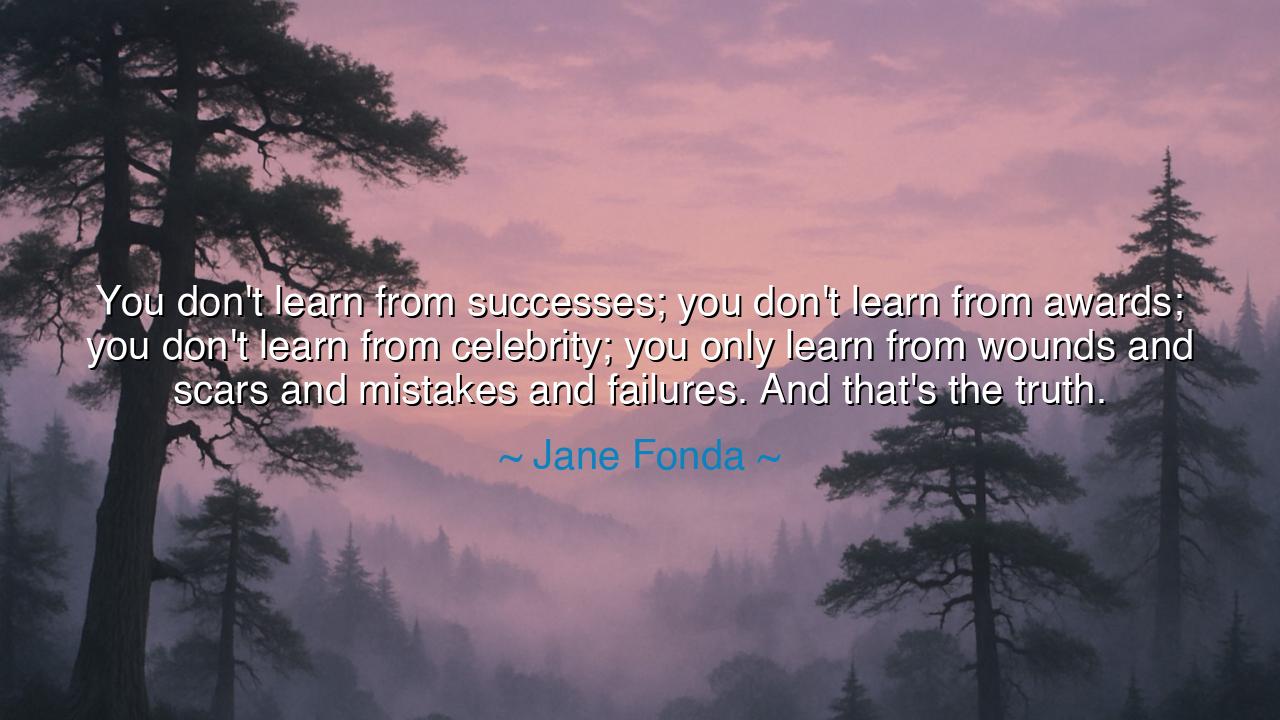
You don't learn from successes; you don't learn from awards; you
You don't learn from successes; you don't learn from awards; you don't learn from celebrity; you only learn from wounds and scars and mistakes and failures. And that's the truth.






Hear the voice of Jane Fonda, who declared with piercing honesty: “You don't learn from successes; you don't learn from awards; you don't learn from celebrity; you only learn from wounds and scars and mistakes and failures. And that's the truth.” These words cut against the illusions of the world, for men are taught to chase after glory, to hunger for applause, to worship the shining crown of success. Yet Fonda reminds us that wisdom is not born in triumph but in failure, not in praise but in pain. The ornaments of life may dazzle, but they do not teach; it is the scars upon the soul that are our truest teachers.
Success is sweet, but it often blinds. When men are crowned with victory, they are tempted to believe they are invincible, that fortune will always smile upon them. In such moments, they rarely reflect, rarely grow, rarely change. But when they stumble, when they taste the bitterness of mistake and the sting of failure, their eyes are opened. Pain humbles the proud, strips away illusions, and forces the soul to wrestle with what is real. Thus, the wound is the doorway to wisdom, and the scar is the mark of a lesson survived.
The ancients knew this well. The Greeks spoke of pathei mathos—“learning through suffering.” They believed that no wisdom worth having could be gained without trial. Consider the story of Odysseus, whose long journey home was marked not by easy victories but by mistakes, losses, and suffering. He learned patience through shipwreck, humility through failure, and endurance through wounds of body and spirit. Had he sailed straight home in triumph, he would have been less wise, less seasoned, less human. It was the scars that made him whole.
So too in our modern age do we see this truth. Think of Abraham Lincoln, who failed in business, lost elections, and endured personal grief before he ever rose to the presidency. Each defeat carved humility into his character, each wound deepened his compassion, each failure taught him endurance. By the time he stood to lead a nation through civil war, he was not a man of untested triumphs but a man shaped by scars, and it was those scars that gave him the strength to carry the burden of a fractured people.
Fonda herself, speaking from her own turbulent life of triumphs and controversies, understood that celebrity and awards are empty when weighed against the lessons of hardship. Applause fades, fame shifts like sand, but the lessons of failure remain etched into the heart forever. She knew that the truth of growth does not lie in being celebrated, but in being broken and choosing to rise again. For it is not the golden trophy that teaches, but the moments when the soul lies in the dust and decides to stand once more.
The lesson for us is clear: do not despise your failures, nor hide your scars in shame. They are not signs of weakness, but of growth. Each wound is a teacher, each scar a testament, each mistake a stepping stone. Do not envy the man who has never fallen; pity him, for his wisdom is shallow. Envy instead the one who has stumbled and risen, who bears the marks of battle upon his spirit, for he has learned what no applause could ever teach.
Therefore, my child, live not in fear of failure. Step boldly into life, knowing you will stumble, knowing you will be wounded, knowing you will err. When you do, embrace the lesson, and let the pain carve wisdom into your soul. For in the end, it is not your awards that will guide you, but your scars; not your triumphs, but your trials; not your victories, but your defeats endured and overcome. This is the truth: wounds teach, scars remember, and failure transforms.






TDNguyen Tien Dung
I agree with Fonda that failure and mistakes are often where the most valuable lessons come from. But sometimes, it feels like society teaches us to avoid failure at all costs. How can we create environments—whether in education, business, or personal life—that encourage risk-taking and learning from mistakes? If we only reward success, how can we foster resilience and personal growth in a world that often punishes failure?
TTBui Tuan Tu
Fonda’s words make me wonder if we truly value the lessons that come from failure. In a world that often celebrates success, can we shift our mindset to see mistakes and setbacks as opportunities for growth? While failure can be painful, it might be the very thing that leads to wisdom. How do we teach younger generations that failure isn’t something to fear, but a vital part of learning and growing?
NNngoc nguyen
This quote makes me reflect on how much we often value success and recognition, yet Fonda argues that these don’t provide real learning. If growth comes through pain and mistakes, how do we reconcile this with the pressure to constantly succeed in a society that rewards perfection? Is there a danger in becoming too focused on failure as a means of growth, or is it essential to embrace our mistakes fully to truly evolve?
YNNguyen Thi Yen Nhi
Jane Fonda’s quote speaks to the value of struggle and growth through adversity. While it’s easy to glorify success and fame, Fonda reminds us that true learning comes from challenges, mistakes, and failure. But does this mean we should actively seek out hardship to grow, or is it more about how we respond to the inevitable failures in life? Can we really learn from everything that hurts, or are some wounds too deep to find meaning in?